新概念英语第二册知识点总结
新概念英语二册课知识点整理
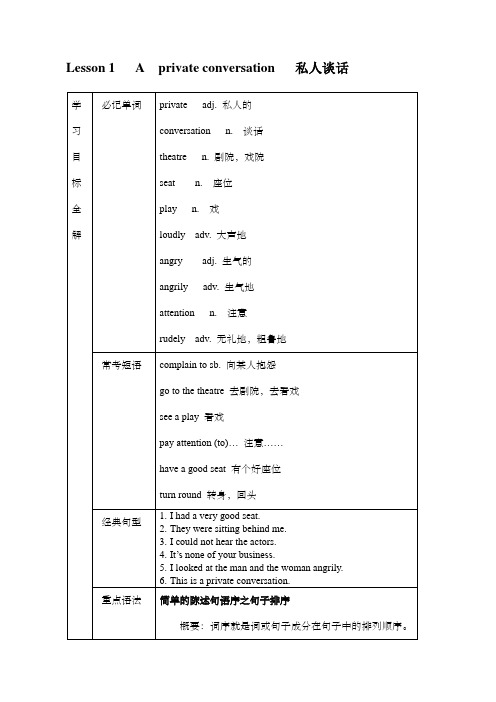
6.I could not bear it.我忍不住了。
bear(bore, borne)v.容忍
bear, stand e.g. I can't bear/stand you
put up with=bear=stand容忍
bear n.熊
bear hug :热情(热烈)的拥抱e.g. give sb. a bear hug
(1)have a seat/place = take a seat /place= get a seat/place
(2)seat座位vs. sit坐
take a seat/take one’s seat/be seated :座下来,就座
seat是及物动词,后面有宾语seat sb.让某人坐下
e.g. You seat him.
public school;public letter公开信;public place :公共场所
private:普通的e.g. private citizen普通公民private life:私生活
(2) conversationn.谈话
topic/subject of conversation:话题
(6)状语的位置:修饰形容词或副词的状语放在被修饰语之前;修饰动词的状语有的放在动词之前,有的放在动词之后。如动词有宾语,状语一般须放在宾语之后。
例:The Summer Palace isverybeautiful.颐和园非常美丽。(very为状语,修饰形容词beautiful,放在beautiful之前)
过去进行时结构:was/ were doing
拓展:过去进行时与现在进行时的区别:
两者都表示动作正在进行,只是时间有别。
新概念英语第二册知识点梳理

新概念英语第二册知识点梳理课文词汇短语句型语法第一单元Lesson 1 A private conversation Private, conversation, seat, play,loudly, angry, angrily, attention,bear, rudely简单陈述句及其语序Lesson 2 Breakfast or lunch? until, outside, ring, repeatnow, often and always,表示现在和经常发生的动作,如:I’m coming to seeyou. / I never get up early on Sundays. /I sometimes stay in bed until lunchtime.Lesson 3 Please send me a card Send, spoil, friendly, lend,decision, whole, single一般过去时(参考第一册第67-78课)Lesson 4 An exciting trip exciting, receive, different,centre, abroad现在完成时(参考第一册第83-90课)Lesson 5 No wrong numbers message, cover, distance,request, service一般过去时与现在完成时的区别Lesson 6 PercyButtonsbeggar, food, pocket, call a, the和some的用法Lesson 7 Too late detective, airport, expect,valuable, steal, main, guard,precious过去进行时,表示过去某个时刻正在发生的动作或状态,如:When I waswatering the garden, it began to rain.Lesson 8 The best and the worst competition, neat, path,wooden, pool比较级和最高级(参考第一册第107-112课)Lesson 9 A cold welcome welcome, crowd, gather, hand,shout, refuse, laugh表示时间的短语,如:at 9 o’clock, atnight, in ten minutes, in 1939, insummer, in August, in January, in theafternoon, on Tuesday, on April 27th,from 9 till 5, during the night, until 10o’clockLesson 10 Not for jazz musical, instrument, recently,damage, key, string, shock,allow, touch(一般过去时中的)被动语态(参考第一册第141-144课)Lesson 11 One good tur deserves another turn, deserve, lawyer, bank,salary, immediately复习第2-10课的关键句型Lesson 12 Goodbye and good luck Luck, captain, sail, harbour,proud, important一般将来时(参考第一册第91-96课)Lesson 13 The Greenwood Boys group, pop singer, club,performance, occasion将来进行时,表示将来某个时刻正在发生的动作或状态,如:I shall bewriting letters all day tomorrow. / Shewill be getting ready for the partytomorrow. / He’ll be arriving in a minute.Lesson 14 Do you speak English? amusing, experience, wave, lift,reply, language, journey过去完成时(参考第一册第119-120课)Lesson 15 Good news secretary, nervous, afford,weak, interrupt(主句动作发生在过去的)间接引语(参考第一册第99-102课和第133-136课)Lesson 16 A polite request park, traffic, ticket, note, area,sign, reminder, fail, obeyif引导的条件句(参考第一册第137-138课)Lesson 17 Always young appear, stage, bright, stocking,sockmust的用法(参考第一册第61-66课):与have to和have got to的区别Lesson 18 He oftendoes this!pub, landlord, bill have的用法(参考第一册第81-82课)Lesson 19 Sold out hurry, ticket office, pity,exclaim, return, sadlycan和may的用法(参考第一册第127-132课)Lesson 20 One man in a boat catch, fisherman, boot, waste,realize动名词的用法(作主语和宾语),如:Reading in bed is something I alwaysenjoy. / She’s afraid of staying in thathouse alone. / After looking at hiswatch, he hurried to the station.Lesson 21 Mad or not? mad, reason, sum, determined (与助动词或情态动词连用的)被动语态的用法(参考第10课)Lesson 22 A glassenvelopedream, age, channel, throw 后面可跟of, from, in, on的动词Lesson 23 A new house complete, modern, strange,district复习第12-21课的关键句型Lesson 24 It could be worse manager, upset, sympathetic,complain, wicked, contain,honesty复习第2-23课的难点第二单元Lesson 25 Do the English speak English? railway, porter, several,foreigner, wonder并列句中的语序Lesson 26 he best art critics art, critic, paint, pretend,pattern, curtain, materialappreciate, notice, whether,hang, critically, upside down经常发生的事情的表达,如:Do youalways get up so late? / The sun rises inthe east and sets in the west. / I hear thatyou like classical music.Lesson 27 A wet night tent, field, smell, wonderful,creep, sleeping bag,comfortable, soundly, leap,heavily, stream, form, wind,right一般过去时(参考第3课)Lesson 28 No parking rare, ancient, myth, trouble,effect现在完成时(参考第4课)Lesson 29 Taxi! taxi, land, plough, lonely, roof, 一般过去时与过去完成时(参考第5block, flat, desert 课)Lesson 30 Football or polo? polo, cut, row, kick, towards,nearly, sighta, the, some和any的用法(参考第6课)Lesson 31 Success story retire, company, bicycle, save,workshop, helper, employ,grandsonused to do的用法Lesson 32 Shopping mode easy once, temptation, article, wrap,simply, arrestas … as…的用法(参考第8课)Lesson 33 Out of the darkness darkness, explain, coast, storm,towards, rock, shore, light,ahea, cliff, struggle, hospital表示方向的短语,如:flew toWashington, flying from Beijing, goneinto the kitchen, threw it out of thewindow, set out for the village, cametowards me, point at peopleLesson 34 Quick work station, most 被动语态(参考第10课)Lesson 35 Stop thief! while, regret, far, rush, act,straight, fright, battered, shortly,afterwards复习第26-34课的关键句型Lesson 36 Across the channel! record, strong, swimmer,succeed, train, anxiously,intend, solid一般将来时:be going to与will(参考第一册第37-40课以及第91-96课)Lesson 37 The Olympic Games Olympic, hold, government,immense, stadium, standard,capital, fantastic, design将来完成时,表示在将来某一时间以前已经完成或一直持续的动作。
新概念英语2_知识点全

新概念英语2_知识点全新概念英语第二册★private adj.私人的① adj. 私人的private life 私生活private school 私立学校It's my private letter. (如果妈妈想看你的信)It's my private house. (如果陌生人想进你的房子)② adj. 普通的private citizen 普通公民I’m a private citizen. (citizen n. 公民)private soldier 大兵《Private Ryan》(《拯救大兵瑞恩》)public adj. 公众的,公开的(private的反义词)public school 公立学校public letter 公开信public place 公共场所privacy n.隐私It’s privacy. 这是我的隐私!(不愿让别人知道的)★conversation n.谈话have a + talk/chat/dialogue/conversation/gossip 名词变动词conversation 一般用于正式文体中, 内容上往往不正式subject of conversation 话题They are having a conversation.talk 内容可正式可不正式, 也可以私人Let’s have a talk.dialogue 对话, 可以指正式国家与国家会谈China and Korea are having a dialogue.chat 闲聊,就是北京人说的“侃”,说的是无关紧要的事。
gossip 嚼舌头, 说长道短★theatre n.剧场, 戏剧cinema n.电影院★seat n.座位have a good seat/place,这里的seat指place(指地点),而不是chair. take a seat/take your seat 坐下来, 就坐Is the seat taken? 这个位置有人吗?请坐的3种说法 :Sit down, please. (命令性)Take your seat, please.Be seated, please. (更礼貌)作为动词的seat与sit的区别sit(sat,sitten) vi. 就座He is sitting there. 他坐在那儿。
新概念二语法点总结
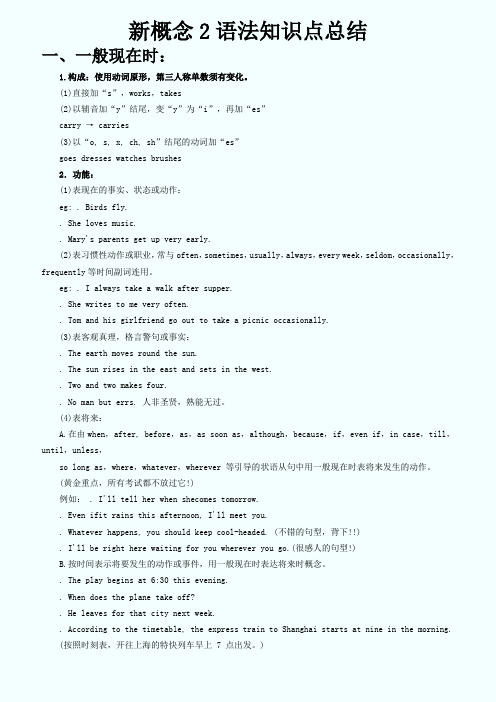
新概念2语法知识点总结一、一般现在时:1.构成:使用动词原形,第三人称单数须有变化。
(1)直接加“s”,works,takes(2)以辅音加“y”结尾,变“y”为“i”,再加“es”carry → carries(3)以“o, s, x, ch, sh”结尾的动词加“es”goes dresses watches brushes2.功能:(1)表现在的事实、状态或动作:eg: . Birds fly.. She loves music.. Mary's parents get up very early.(2)表习惯性动作或职业,常与often,sometimes,usually,always,every week,seldom,occasionally,frequently等时间副词连用。
eg: . I always take a walk after supper.. She writes to me very often.. Tom and his girlfriend go out to take a picnic occasionally.(3)表客观真理,格言警句或事实:. The earth moves round the sun.. The sun rises in the east and sets in the west.. Two and two makes four.. No man but errs. 人非圣贤,熟能无过。
(4)表将来:A.在由when,after, before,as,as soon as,although,because,if,even if,in case,till,until,unless,so long as,where,whatever,wherever 等引导的状语从句中用一般现在时表将来发生的动作。
(黄金重点,所有考试都不放过它!)例如: . I'll tell her when shecomes tomorrow.. Even ifit rains this afternoon, I'll meet you.. Whatever happens, you should keep cool-headed. (不错的句型,背下!!). I'll be right here waiting for you wherever you go.(很感人的句型!)B.按时间表示将要发生的动作或事件,用一般现在时表达将来时概念。
(完整版)新概念第二册每一课重点的总结
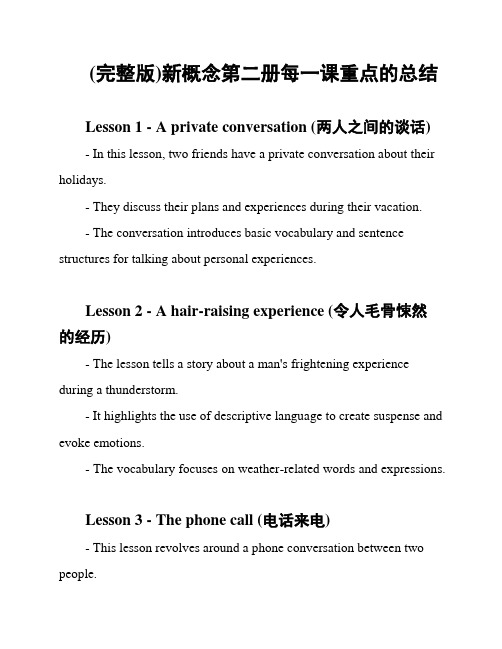
(完整版)新概念第二册每一课重点的总结Lesson 1 - A private conversation (两人之间的谈话)- In this lesson, two friends have a private conversation about their holidays.- They discuss their plans and experiences during their vacation.- The conversation introduces basic vocabulary and sentence structures for talking about personal experiences.Lesson 2 - A hair-raising experience (令人毛骨悚然的经历)- The lesson tells a story about a man's frightening experience during a thunderstorm.- It highlights the use of descriptive language to create suspense and evoke emotions.- The vocabulary focuses on weather-related words and expressions.Lesson 3 - The phone call (电话来电)- This lesson revolves around a phone conversation between two people.- The dialogue also includes expressions for making suggestions and giving advice.Lesson 4 - A famous monastery (一座著名的修道院) - The lesson describes a visit to a famous monastery.- It introduces vocabulary related to religious buildings and their surroundings.- Additionally, it provides practice in forming questions and giving short answers.Lesson 5 - A trip to Australia (澳大利亚之行)- In this lesson, a young girl talks about her trip to Australia.- Vocabulary related to travel, geography, and animals is presented.Lesson 6 - A rainy Saturday (一个雨天的星期六)- The lesson portrays a girl's activities on a rainy Saturday.- It introduces vocabulary relevant to hobbies and leisure activities.- The use of present continuous tense is emphasized to describe ongoing actions.Lesson 7 - Money, money, money! (金钱,金钱,金钱!)- This lesson explores the influence of money on people's lives.- It introduces vocabulary related to finance, business, and personal finances.- The dialogue highlights the use of modal verbs for making suggestions and giving advice.Lesson 8 - Mr. Hiker (远足先生)- The lesson narrates Mr. Hiker's experience hiking in the mountains.- Vocabulary related to nature, camping, and hiking is presented.- The past simple tense is practiced to describe past events.Lesson 9 - No parking (禁止停车)- This lesson focuses on the concept of parking restrictions.- Vocabulary related to road signs, transportation, and rules is introduced.Lesson 10 - Cycling for charity (骑自行车为慈善事业)- The lesson discusses a charity event involving cycling.- Vocabulary related to sports, charity, and participation in events is presented.- The dialogue emphasizes the use of phrasal verbs and expressions related to physical activities.Lesson 11 - Adventure sports (冒险运动)- In this lesson, different adventure sports are introduced and discussed.- Vocabulary related to extreme sports, risk-taking, and outdoor activities is presented.- The lesson also focuses on the use of present perfect tense to describe past experiences.Lesson 12 - Life in a big city (大城市的生活)- The lesson describes the advantages and disadvantages of living in a big city.- It introduces vocabulary related to urban life, city services, and facilities.- The dialogue includes phrases for expressing opinions and preferences.[...continued...]。
新概念英语第二册知识点

新概念英语第二册知识点新概念英语第二册是英语学习中的重要教材,对于提升英语综合能力有着显著的作用。
以下将为您详细介绍其中的一些重要知识点。
一、语法知识1、一般过去时这是第二册中频繁出现的时态。
用于表示过去某个特定时间发生的动作或存在的状态。
例如:“I went to the cinema yesterday” (我昨天去看电影了。
)需要注意动词的过去式变化规则,有规则变化(如:play played)和不规则变化(如:go went)。
2、过去进行时强调过去某个时刻正在进行的动作。
句子结构通常为“was/were +动词的现在分词”。
比如:“I was reading a book at eight o'clock last night” (昨晚八点我正在读书。
)3、现在完成时用来表示过去发生的动作对现在造成的影响或结果。
其构成是“have/has +过去分词”。
像:“I have already finished my homework”(我已经完成了作业。
)4、宾语从句在句子中充当宾语的从句叫宾语从句。
要注意宾语从句的语序要用陈述句语序。
例如:“He said that he would come” (他说他会来。
)5、直接引语和间接引语直接引用别人的话叫直接引语,用自己的话转述别人的话叫间接引语。
转换时要注意时态、人称和指示代词等的变化。
二、词汇积累1、常用动词短语如:look after(照顾)、put on(穿上)、take off(脱下)等,这些短语在日常表达中非常实用。
2、形容词和副词的比较级和最高级学习如何表达程度的差异,如:good better best,bad worse worst 等。
3、介词的用法掌握如 at、in、on 等介词在时间、地点表达上的不同用法。
三、课文理解1、理解文章主旨每篇课文都有其主题,通过阅读要能够抓住主要内容。
2、分析句子结构对于课文中的长难句,要学会分析其结构,理解句子成分。
新概念英语2 知识点全

—-可编辑修改,可打印——别找了你想要的都有!精品教育资料——全册教案,,试卷,教学课件,教学设计等一站式服务——全力满足教学需求,真实规划教学环节最新全面教学资源,打造完美教学模式新概念英语第二册A private conversationadj.私人的①adj. 私人的private life 私生活private school 私立学校It's my private letter. (如果妈妈想看你的信)It's my private house. (如果陌生人想进你的房子)②adj. 普通的private citizen 普通公民I’m a private citizen. (citizen n. 公民)private soldier 大兵《Private Ryan》(《拯救大兵瑞恩》)public adj. 公众的,公开的(private的反义词)public school 公立学校public letter 公开信public place 公共场所privacy n.隐私It’s privacy. 这是我的隐私!(不愿让别人知道的)★conversation n.谈话have a + talk/chat/dialogue/conversation/gossip 名词变动词conversation 一般用于正式文体中, 内容上往往不正式subject of conversation 话题They are having a conversation.talk 内容可正式可不正式, 也可以私人Let’s have a talk.dialogue 对话, 可以指正式国家与国家会谈China and Korea are having a dialogue.chat 闲聊,就是北京人说的“侃”,说的是无关紧要的事。
gossip 嚼舌头, 说长道短★theatre n.剧场, 戏剧cinema n.电影院★seat n.座位have a good seat/place,这里的seat指place(指地点),而不是chair.take a seat/take your seat 坐下来, 就坐Is the seat taken? 这个位置有人吗?请坐的3种说法:Sit down, please. (命令性)Take your seat, please.Be seated, please. (更礼貌)作为动词的seat与sit的区别sit(sat,sitten)vi. 就座He is sitting there. 他坐在那儿。
新概念二册知识点总结
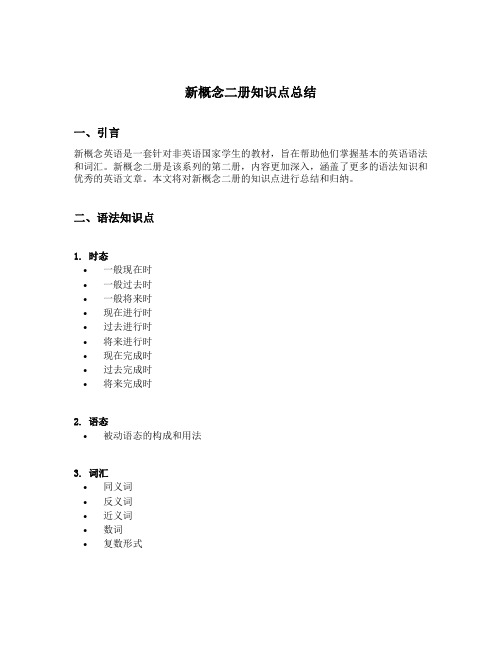
新概念二册知识点总结一、引言新概念英语是一套针对非英语国家学生的教材,旨在帮助他们掌握基本的英语语法和词汇。
新概念二册是该系列的第二册,内容更加深入,涵盖了更多的语法知识和优秀的英语文章。
本文将对新概念二册的知识点进行总结和归纳。
二、语法知识点1. 时态•一般现在时•一般过去时•一般将来时•现在进行时•过去进行时•将来进行时•现在完成时•过去完成时•将来完成时2. 语态•被动语态的构成和用法3. 词汇•同义词•反义词•近义词•数词•复数形式•冠词•指示代词•不定代词•物主代词5. 名词•单数形式•复数形式•可数名词•不可数名词6. 代词•主格代词•宾格代词•形容词性物主代词•名词性物主代词7. 形容词和副词•基本形式和比较级•最高级•形容词和副词的用法差异8. 动词•不规则动词的变形•动词的时态和语态•动词的逻辑主语9. 副词•修饰动词、形容词和副词的副词•频度副词•方式副词•常用介词及其用法•介词短语三、篇章与文章理解1. 阅读理解•阅读速度和准确性•理解文章的主旨和细节•推断出文章中的事实和观点2. 词汇理解•根据上下文推断单词的意思•掌握常见的词义和用法3. 注意事项•注意标点符号的作用•注意词性和语法关系4. 写作•书面表达的能力•语法和语义的准确性•逻辑性和连贯性四、学习方法与技巧1. 多听多说多读多写•掌握正确的语音和语调•培养英语思维2. 刻意练习•针对薄弱点进行有目的的练习•善用课外资料和资源3. 反思和复习•反思自己的学习过程和方法•定期复习、巩固知识4. 学习小组和讨论•与同学一起学习和讨论•分享学习资源和经验5. 词汇积累和扩展•每日积累新单词•扩展词汇的应用场景五、总结新概念二册是提高英语水平的重要教材,其中包含了丰富的语法知识和篇章阅读理解。
通过系统地学习和实践,我们可以提高自己的语言能力,并且在与他人交流中更加自信和流利。
为了更好的掌握所学内容,我们还要运用学习方法和技巧,不断积累新词汇,扩展语言的应用范围。
新概念第二册知识点梳理
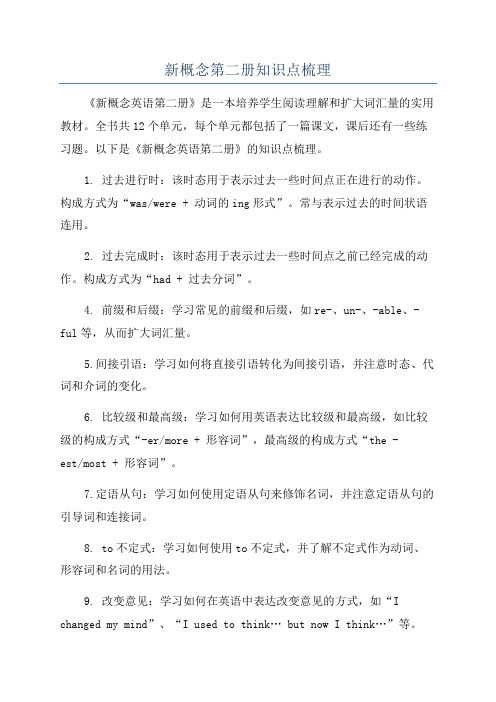
新概念第二册知识点梳理《新概念英语第二册》是一本培养学生阅读理解和扩大词汇量的实用教材。
全书共12个单元,每个单元都包括了一篇课文,课后还有一些练习题。
以下是《新概念英语第二册》的知识点梳理。
1. 过去进行时:该时态用于表示过去一些时间点正在进行的动作。
构成方式为“was/were + 动词的ing形式”。
常与表示过去的时间状语连用。
2. 过去完成时:该时态用于表示过去一些时间点之前已经完成的动作。
构成方式为“had + 过去分词”。
4. 前缀和后缀:学习常见的前缀和后缀,如re-、un-、-able、-ful等,从而扩大词汇量。
5.间接引语:学习如何将直接引语转化为间接引语,并注意时态、代词和介词的变化。
6. 比较级和最高级:学习如何用英语表达比较级和最高级,如比较级的构成方式“-er/more + 形容词”,最高级的构成方式“the -est/most + 形容词”。
7.定语从句:学习如何使用定语从句来修饰名词,并注意定语从句的引导词和连接词。
8. to不定式:学习如何使用to不定式,并了解不定式作为动词、形容词和名词的用法。
9. 改变意见:学习如何在英语中表达改变意见的方式,如“I changed my mind”、“I used to think… but now I think…”等。
10.分词作状语:学习如何使用分词作为状语,表示原因、时间、条件、方式等。
11. 现在完成时:该时态用于表示过去一些时间点过去发生的动作对现在造成的影响。
构成方式为“have/has + 过去分词”。
12. 结构介词:学习常见的结构介词,如“agree to”、“depend on”等,并了解它们的搭配和用法。
以上是《新概念英语第二册》的主要知识点梳理。
通过学习这些知识点,学生可以扩大词汇量,提高阅读理解能力,并提高自己的英语表达能力。
希望对你的学习有所帮助。
新概念第二册的文法重点总结
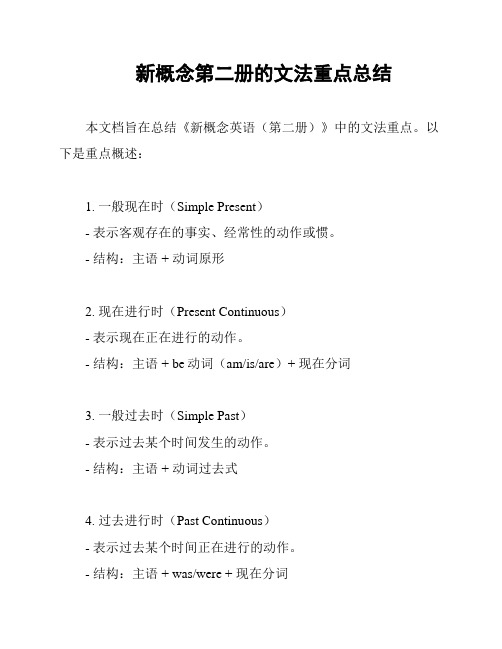
新概念第二册的文法重点总结本文档旨在总结《新概念英语(第二册)》中的文法重点。
以下是重点概述:1. 一般现在时(Simple Present)- 表示客观存在的事实、经常性的动作或惯。
- 结构:主语 + 动词原形2. 现在进行时(Present Continuous)- 表示现在正在进行的动作。
- 结构:主语 + be动词(am/is/are)+ 现在分词3. 一般过去时(Simple Past)- 表示过去某个时间发生的动作。
- 结构:主语 + 动词过去式4. 过去进行时(Past Continuous)- 表示过去某个时间正在进行的动作。
- 结构:主语 + was/were + 现在分词5. 一般将来时(Simple Future)- 表示将来将要发生的动作或情况。
- 结构:主语 + will + 动词原形6. 动词不定式(Infinitives)- 被用作主语、宾语、表语或补语的动词形式。
- 结构:to + 动词原形7. 动名词(Gerunds)- 被用作主语、宾语或表语的动词形式。
- 结构:动词原形 + -ing8. 定语从句(Relative Clauses)- 用来修饰名词或代词的句子。
- 结构:关系代词(who/whom/whose/which)+ 主句9. 状语从句(Adverbial Clauses)- 用来修饰动词、形容词或副词的从句。
- 结构:从属连词 + 主句10. 不定代词(Indefinite Pronouns)- 指代不确定或泛指的人或事物。
- 包括somebody, anybody, nobody, something, anything, nothing 等等。
以上是《新概念英语(第二册)》的文法重点总结。
希望对您的学习有所帮助。
新概念英语第二册知识点梳理

Lesson 14 Do you speak English?
Lesson 15 Good news
Lesson 16 A polite request Lesson 17 Always young Lesson 18 He often does this! Lesson 19 Sold out
Lesson 20 One man in a boat
musical, instrument, recently, damage, key, string, shock, allow, touch turn, deserve, lawyer, bank, salary, immediately Luck, captain, sail, harbour, proud, important
并列句中的语序 经常发生的事情的表达,如:Do you always get up so late? / The sun rises in the east and sets in the west. / I hear that you like classical music.
一般过去时(参考第 3 课)
一般过去时(参考第一册第 67-78 课)
现在完成时(参考第一册第 83-90 课)
一般过去时与现在完成时的区别
a, the 和 some 的用法
过去进行时,表示过去某个时刻正在 发生的动作或状态,如:When I was watering the garden, it began to rain. 比较级和最高级(参考第一册第 107-112 课) 表示时间的短语,如:at 9 o’clock, at night, in ten minutes, in 1939, in summer, in August, in January, in the afternoon, on Tuesday, on April 27th, from 9 till 5, during the night, until 10 o’clock
(完整版)新概念英语第二册课文语法短语知识点
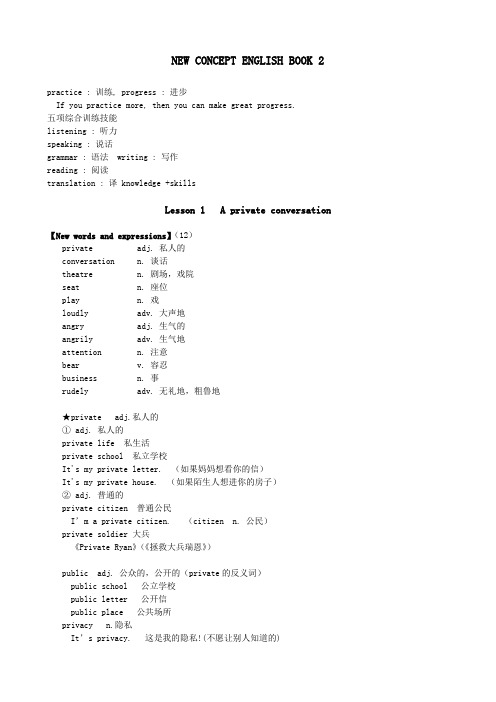
★seat n.座位
have a good seat/place,这里的seat指place(指地点),而不是chair.
take a seat/take your seat 坐下来, 就坐
Is the seat taken? 这个位置有人吗?
请坐的3种说法 :
Sit down,please. (命令性)
② vt. 忍受(一般与can/could连用于疑问句及否定句中)
She eats too fast.Ican’t bear to watch/watching her. 她吃得太快。我看着受不了。
How can you bear living in this place? 你怎么能受得了住在这个地方?
private soldier 大兵
《Private Ryan》(《拯救大兵瑞恩》)
publicadj.公众的,公开的(private的反义词)
public school 公立学校
public letter 公开信
public place 公共场所
privacy n.隐私
It’s privacy. 这是我的隐私!(不愿让别人知道的)
★angrily adv. 生气的
angry =cross
I was angry./He was cross.
annoyed: 恼火的;
be blue in the face 脸上突然变色
程 I was annoyed.
度 I was angry/cross.
加 I was very angry.
深 I am blue in the face. (脸色都青了, 相当生气了)
bear =stand =put up with
(完整版)新概念2知识点总结

新概念2知识点总结第一部分、时态总结一、一般过去时;一、定义。
1. 表示过去的动作或状态,常和明确的过去时间状语连用,如:yesterday, last week, three days ago, in 1998,just now等,或与由when引导的从句连用。
2. 也可以表示过去某一段时间内经常或反复出现的动作。
句子中常带有every day, often, usually, always, sometimes等时间状语。
例:When I worked in the company, I got up early every morning.在那家公司上班时,我每天早晨都起得很早。
In the past few years she usually went touring during her summer holidays.在过去的几年里,每逢暑假她总是出去旅游。
二、一般过去时态句子结构1.Be 动词的一般过去时态在没有实义动词的句子中使用be动词,am is 的过去式为was; are的过去式为were.如:I was late yesterday.We weren't late yesterday.She wasn't a teacher three years ago.Were you ill yesterday?Were they once your classmates?---Yes, I was. ---No, I wasn't.Who were your best friends in your primary school?2. 实义动词的一般过去时态肯定句要使用动词的过去式,否定句和疑问句要使用助动词do和does 的过去式did.如:I went home at nine o'clock yesterday.I didn't go home yesterday. He didn't tell me about you.Did you go home yesterday?---Yes, I did. ---No, I didn't.When did you finish your homework last night/the day before yesterday? 3. 助动词和情态动词过去式如下:shall―should(将要)用于第一人称单数will―would(将要)用于所有人称can―could(能,会)may―might(可以)must―must (必须)have to―had to(不得不)助动词和情态动词的过去时态要使用他们的过去式,后面的动词还使用原形。
新概念第二册语法知识点汇总(完美版)
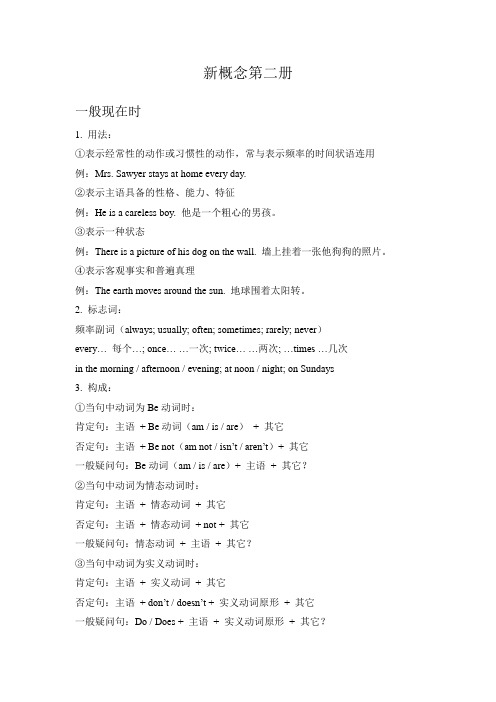
新概念第二册一般现在时1. 用法:①表示经常性的动作或习惯性的动作,常与表示频率的时间状语连用例:Mrs. Sawyer stays at home every day.②表示主语具备的性格、能力、特征例:He is a careless boy. 他是一个粗心的男孩。
③表示一种状态例:There is a picture of his dog on the wall. 墙上挂着一张他狗狗的照片。
④表示客观事实和普遍真理例:The earth moves around the sun. 地球围着太阳转。
2. 标志词:频率副词(always; usually; often; sometimes; rarely; never)every… 每个…; once… …一次; twice… …两次; …times …几次in the morning / afternoon / evening; at noon / night; on Sundays3. 构成:①当句中动词为Be动词时:肯定句:主语+ Be动词(am / is / are)+ 其它否定句:主语+ Be not(am not / isn’t / aren’t)+ 其它一般疑问句:Be动词(am / is / are)+ 主语+ 其它?②当句中动词为情态动词时:肯定句:主语+ 情态动词+ 其它否定句:主语+ 情态动词+ not + 其它一般疑问句:情态动词+ 主语+ 其它?③当句中动词为实义动词时:肯定句:主语+ 实义动词+ 其它否定句:主语+ don’t / doesn’t + 实义动词原形+ 其它一般疑问句:Do / Does + 主语+ 实义动词原形+ 其它?●特别注意:一般现在时,当主语为第三人称单数时,实义动词变其三单形式。
do和does为一般现在时的助动词,在否定句及疑问句中辅助实义动词使用,当句中有助动词do和does时,实义动词变原形(吸星大法/ 照妖镜)。
新概念英语第二册知识点总结

新概念英语第二册知识点总结一、语法知识点。
1. 时态。
- 一般现在时。
- 用法:表示经常发生的动作或存在的状态,客观事实或真理等。
例如:He often goes to school by bike.(表示经常的动作)The earth moves around the sun.(客观真理)- 动词形式:主语为第三人称单数时,动词要加 -s或 -es,其余情况用原形。
- 一般过去时。
- 用法:表示过去某个时间发生的动作或存在的状态。
例如:I saw him yesterday.- 动词形式:规则动词一般在词尾加 -ed,不规则动词有特殊变化(如go - went,see - saw等)。
- 现在进行时。
- 用法:表示此时此刻正在进行的动作,也可表示现阶段正在进行但此刻不一定在做的动作。
例如:She is reading a book now.(此刻正在读)He is working on a project this month.(现阶段正在做)- 动词形式:be动词(am/is/are)+动词的 -ing形式。
- 过去进行时。
- 用法:表示过去某个时刻或某段时间正在进行的动作。
例如:When I called him, he was having dinner.- 动词形式:be动词(was/were)+动词的 -ing形式。
- 现在完成时。
- 用法:表示过去发生的动作对现在造成的影响或结果,或者表示从过去开始一直持续到现在的动作或状态。
例如:I have lost my key.(过去丢钥匙,现在找不到)He has lived here for ten years.(从过去住到现在,持续了十年)- 动词形式:have/has +过去分词。
- 过去完成时。
- 用法:表示在过去某个时间或动作之前已经发生或完成的动作,即“过去的过去”。
例如:When I got to the station, the train had already left.- 动词形式:had +过去分词。
新概念英语2知识点全
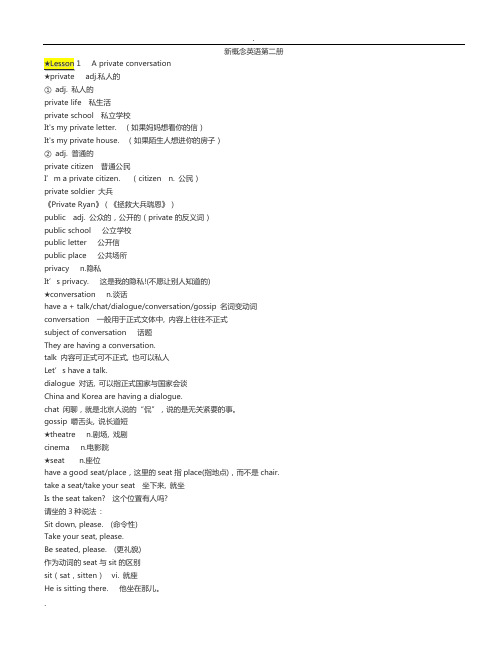
新概念英语第二册A private conversationadj.私人的①adj. 私人的private life 私生活private school 私立学校It's my private letter. (如果妈妈想看你的信)It's my private house. (如果陌生人想进你的房子)②adj. 普通的private citizen 普通公民I’m a private citizen. (citizen n. 公民)private soldier 大兵《Private Ryan》(《拯救大兵瑞恩》)public adj. 公众的,公开的(private的反义词)public school 公立学校public letter 公开信public place 公共场所privacy n.隐私It’s privacy. 这是我的隐私!(不愿让别人知道的)★conversation n.谈话have a + talk/chat/dialogue/conversation/gossip 名词变动词conversation 一般用于正式文体中, 内容上往往不正式subject of conversation 话题They are having a conversation.talk 内容可正式可不正式, 也可以私人Let’s have a talk.dialogue 对话, 可以指正式国家与国家会谈China and Korea are having a dialogue.chat 闲聊,就是北京人说的“侃”,说的是无关紧要的事。
gossip 嚼舌头, 说长道短★theatre n.剧场, 戏剧cinema n.电影院★seat n.座位have a good seat/place,这里的seat指place(指地点),而不是chair. take a seat/take your seat 坐下来, 就坐Is the seat taken? 这个位置有人吗?请坐的3种说法:Sit down, please. (命令性)Take your seat, please.Be seated, please. (更礼貌)作为动词的seat与sit的区别sit(sat,sitten)vi. 就座He is sitting there. 他坐在那儿。
新概念二册知识点总结
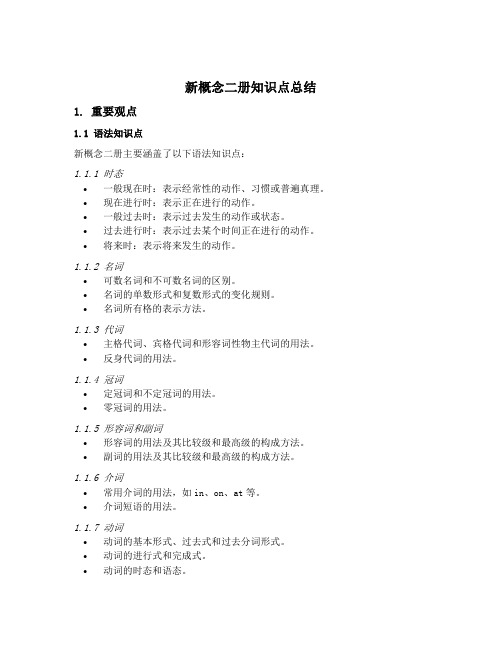
新概念二册知识点总结1. 重要观点1.1 语法知识点新概念二册主要涵盖了以下语法知识点:1.1.1 时态•一般现在时:表示经常性的动作、习惯或普遍真理。
•现在进行时:表示正在进行的动作。
•一般过去时:表示过去发生的动作或状态。
•过去进行时:表示过去某个时间正在进行的动作。
•将来时:表示将来发生的动作。
1.1.2 名词•可数名词和不可数名词的区别。
•名词的单数形式和复数形式的变化规则。
•名词所有格的表示方法。
1.1.3 代词•主格代词、宾格代词和形容词性物主代词的用法。
•反身代词的用法。
1.1.4 冠词•定冠词和不定冠词的用法。
•零冠词的用法。
1.1.5 形容词和副词•形容词的用法及其比较级和最高级的构成方法。
•副词的用法及其比较级和最高级的构成方法。
1.1.6 介词•常用介词的用法,如in、on、at等。
•介词短语的用法。
1.1.7 动词•动词的基本形式、过去式和过去分词形式。
•动词的进行式和完成式。
•动词的时态和语态。
1.2 阅读技巧新概念二册通过一系列文章的阅读,培养了学生的阅读理解能力和阅读技巧。
其中重要的观点包括:1.2.1 预测内容在阅读文章之前,通过阅读标题、图片和段落开头,预测文章的大致内容。
这样可以帮助学生更好地理解文章,并提前预习相关词汇和知识点。
1.2.2 理解上下文在阅读过程中,遇到不认识的单词或短语时,可以通过上下文的提示来猜测其意思。
通过理解上下文,可以更好地理解文章的整体意思。
1.2.3 掌握关键词在阅读文章时,要注意抓住关键词,这些关键词通常是文章的中心思想或主题。
通过掌握关键词,可以更好地理解文章的主旨。
1.2.4 找出关键信息在阅读过程中,要注意找出文章中的关键信息,包括人物、地点、时间、事件等。
这些信息对于理解文章的细节和推断作者意图非常重要。
2. 关键发现2.1 语法规则通过学习新概念二册,我们发现了一些重要的语法规则:2.1.1 一般现在时一般现在时用于表示经常性的动作、习惯或普遍真理。
最全的新概念英语第二册语法汇总
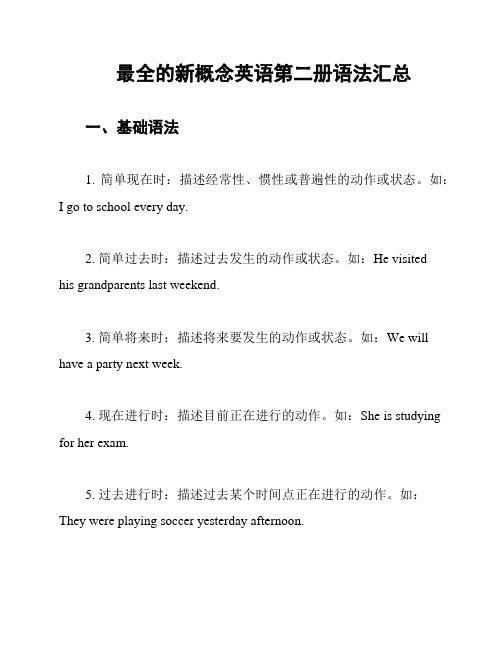
最全的新概念英语第二册语法汇总一、基础语法1. 简单现在时:描述经常性、惯性或普遍性的动作或状态。
如:I go to school every day.2. 简单过去时:描述过去发生的动作或状态。
如:He visitedhis grandparents last weekend.3. 简单将来时:描述将来要发生的动作或状态。
如:We will have a party next week.4. 现在进行时:描述目前正在进行的动作。
如:She is studying for her exam.5. 过去进行时:描述过去某个时间点正在进行的动作。
如:They were playing soccer yesterday afternoon.6. 将来进行时:描述将来某个时间将会进行的动作。
如:I will be working late tonight.二、进阶语法1. 被动语态:表示动作的承受者在句中更重要。
如:The book was written by him.2. 间接引语:重述别人说的话,常常使用动词say、tell等。
如:He said that he was tired.3. 定语从句:用来修饰名词,常以关系代词who、which、that引导。
如:The man who is talking to Mary is my uncle.4. 倒装句:将句子的主语和谓语动词的位置颠倒。
如:Only by working hard can you achieve success.5. 条件句:表示假设、条件或可能性,分为三种类型。
如:If I have time, I will go to the party.6. 反意疑问句:通常由一个肯定句和一个否定短语组成。
如:You like coffee, don't you?三、高级语法2. 主语从句:作为句子的主语,由连词that引导。
- 1、下载文档前请自行甄别文档内容的完整性,平台不提供额外的编辑、内容补充、找答案等附加服务。
- 2、"仅部分预览"的文档,不可在线预览部分如存在完整性等问题,可反馈申请退款(可完整预览的文档不适用该条件!)。
- 3、如文档侵犯您的权益,请联系客服反馈,我们会尽快为您处理(人工客服工作时间:9:00-18:30)。
L e s s o n4A n E x c i t i n g t r i p
★exciting
exciting adj. 令人兴奋的
excited adj. 兴奋的
excite vt. 使...激动 excite sb. (eg.This news excited me.)
-ed: 自己感到
-ing:令人感到
This news is ___________. 这个新闻令人兴奋。
I am _________. 我很激动。
interesting adj. 令人感到有趣的
interested adj. 感到有意思的
interest vt. 使....产生兴趣(n.利息,兴趣,爱好,感兴趣的事)
___________ man 有趣的男人
《Gone with the wind》is a very ___________ book. 《飘》是一本非常有趣的书。
That toy ________ me. 那个玩具让我觉得有趣。
★receive v. 接受, 收到
①vt. 接到,收到,得到
When did you receive that letter?
② vt. 招待,接待
You need a large room if you are going to receive so many gues ts.
receive是“收到”,指的是一个被动的动作,主观上接受与否不清楚。
receive/have a letter from sb.
同类词:
accept 同意接收
This morning I received a bunch of flowers from a boy,but I didn't accept i t.
take则是主动的“拿”、“取”
I received a beautiful pen from my uncle. My brother took it from me yester d a y. take也可以作收到
take the exam 考试
take advice 接受建议
★firm n. 商行, 公司
company n. 公司
★different adj. 不同的
①adj. 不同的,相异的(经常与from连用)
We are planning something different this year. 我们今年有不同的打算。
My room is different from yours. ___________________________________ ②adj. 各种各样的,不同的
This department store sells a large number of different things.
这家百货商店出售许多各种各样的东西。
He has visited ______________________ in China. 他去过中国的不少地方。
★abroad adv. 在国外(副词, 直接和动词连用)
go abroad 去国外
live abroad 国外定居
study abroad 国外学习
【课文讲解】
1、I have just received a letter from my brother, Tim.
同位语:一个名词(或短语等)与另一个名词(或短语)并列而作为其说明或限定成分时称为同位语。
同位语与它所补充说明的成分之间用逗号隔开。
在译成汉语时,同位语或者插入主句中,或者另译为一句,很少像英语中那样用逗号隔开。
Mrs. Smith, my neighbore, has never been abroad.
我的邻居史密斯夫人从来没有出过国。
_________________________________________这位是John,他是我最好的朋友之一。
2、He has been there for six months.
I have arrived in Beijing. (arrive 是瞬间动词不能和段时间连用)has been + in 地点
He has been in Beijing for one year.
He has been in America for tow years.
3.He is working for a big firm and he has already visited a great number of diffe rent places in Australia.
work for在……上班/任职,强调work
a number of + 可数名词复数
number前可加great,large,good ,small,certain等形容词,数量大小也随之改变。
a great number of = a lot of
A large/great number of our students are Danish(丹麦人).
There are a small number of spelling mistakes in your homework.
a lot of + 可数名词/不可数名词
4.He has just bought an Australian car and has gone to Alice springs, a small tow n in the centre of Australia.
has gone to 去了某地没回来
has been to 曾经去过某地, 现在不在那个地方
Have you been to Paris?
5、From there, he will fly to Perth.
fly to Perth = go to Perth by air
6.My brother has never been abroad before, so he is fending this trip very exciting.
before在句子后是副词, 译为“在此之前”,是现在完成时态的标志
find作“发现”、“发觉”讲时宾语往往带补足语(一般为形容词),说明宾语的状况、性质等。
find +宾语+形容词 (做宾补)
find the room clean find her happy。
